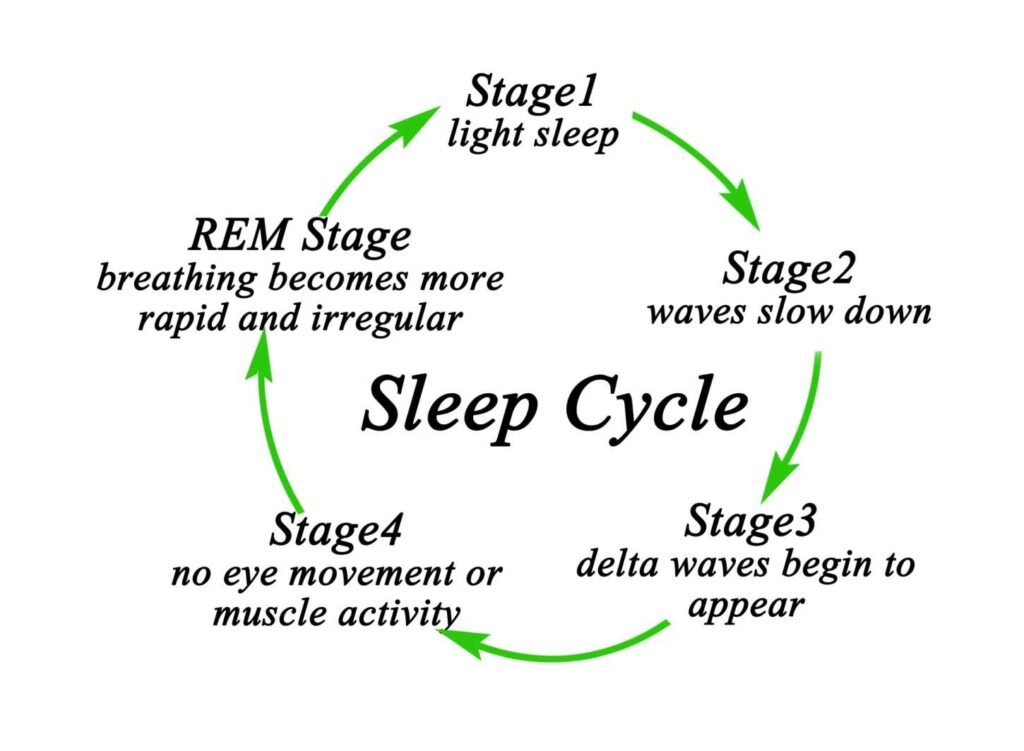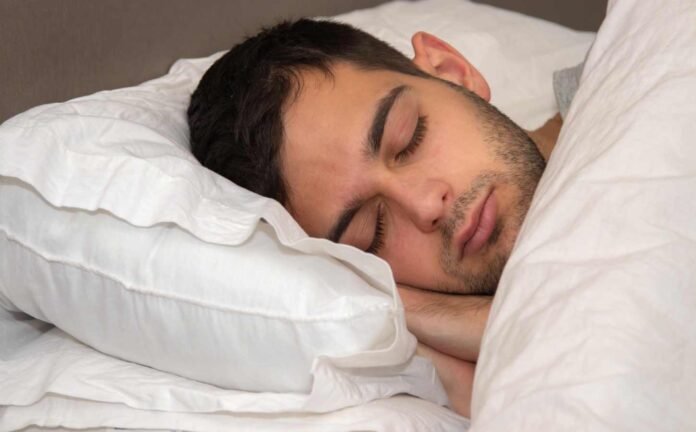Stage 1 Non-Rapid Eye Movement Sleep is the first stage of the sleep cycle.
During Stage 1 Non-Rapid Eye Movement Sleep, the brain waves slow down, and the body begins to relax. It is a transitional stage between wakefulness and sleep, lasting only a few minutes. Stage 1 NREM sleep is essential for maintaining a healthy sleep cycle and overall well-being.
Adults and children experience Stage 1 Non-Rapid Eye Movement Sleep, with children spending more time in this stage than adults. During this stage, the body may twitch or jerk, which is a normal occurrence. The brain is still processing information during this stage, and it is possible to be woken up easily.
Understanding the different stages of sleep is crucial for maintaining a healthy sleep pattern. Each stage of sleep serves a unique purpose in the body’s restorative process. Stage 1 Non-Rapid Eye Movement Sleep is the first step towards a restful night’s sleep. By learning more about this stage, individuals can take steps to improve their sleep quality and overall well-being.

Characteristics of Stage 1 NREM Sleep
Transition to Sleep and Brain Wave Patterns
Stage 1 Non-Rapid Eye Movement (NREM) sleep is the first stage of sleep that occurs when an individual is transitioning from wakefulness to sleep. During this stage, the brain wave patterns begin to slow down from the alpha waves of wakefulness to the slower theta waves. These theta waves are characterized by a frequency of 4-7 Hz and are accompanied by a decrease in brain activity as measured by the electroencephalogram (EEG).
As the individual falls deeper into sleep, there may be brief bursts of brain activity known as sleep Spindles and K-complexes. Sleep spindles are brief bursts of brain activity that last for about 0.5-3 seconds and are characterized by a frequency of 11-16 Hz. K-complexes are larger bursts of brain activity that last for about 1-2 seconds and are characterized by a frequency of 0.5-2 Hz.
Physiological Changes
During Stage 1 Non-Rapid Eye Movement Sleep, there are also several physiological changes that occur. The individual’s heart rate and breathing begin to slow down, and there is a decrease in muscle tone. The individual may also experience hypnic jerks, which are brief muscle contractions that can occur as the individual falls asleep.
There is no eye movement during Stage 1 NREM sleep, and blood pressure begins to decrease. The individual may also experience a decrease in body temperature as they fall deeper into sleep.
Overall, Stage 1 Non-Rapid Eye Movement Sleep is a transitional stage of sleep that occurs as an individual is falling asleep. It is characterized by a decrease in brain activity and the onset of slower theta waves. While there may be brief bursts of brain activity such as sleep spindles and K-complexes, the individual’s heart rate, breathing, and muscle tone begin to slow down as they fall deeper into sleep.
Significance and Disorders Related to Stage 1 NREM Sleep
Role in Sleep Quality and Health
Stage 1 Non-Rapid Eye Movement (NREM) sleep is the first stage of sleep, accounting for 5% of the total sleep cycle. It occurs when a person is in a transitional state between wakefulness and sleep. During this stage, the body begins to relax, and the brain waves slow down, preparing the body for deeper sleep.
Research has shown that Stage 1 NREM sleep plays a crucial role in sleep quality and overall health. It is during this stage that the body produces growth hormone, which is essential for tissue repair and regeneration. It also regulates metabolism, helping the body to maintain a healthy weight.
Furthermore, Stage 1 Non-Rapid Eye Movement Sleep is critical for memory consolidation. During this stage, the brain processes and stores memories, helping individuals to retain information and learn new things.
Common Sleep Disorders in Stage 1
Several sleep disorders are associated with Stage 1 Non-Rapid Eye Movement Sleep. Insomnia is a common sleep disorder that affects millions of people worldwide. It is characterized by difficulty falling asleep or staying asleep, leading to daytime fatigue and decreased productivity.
Sleep apnea is another sleep disorder that affects Stage 1 Non-Rapid Eye Movement Sleep. It is a condition in which a person’s breathing is interrupted during sleep, leading to frequent awakenings and a decrease in sleep quality.
Restless legs syndrome and sleepwalking are also associated with Stage 1 NREM sleep. Restless legs syndrome is a condition in which a person experiences an uncomfortable sensation in their legs, leading to an irresistible urge to move them. Sleepwalking, on the other hand, is a condition in which a person walks or performs other activities while asleep.
Overall, Stage 1 Non-Rapid Eye Movement Sleep plays a crucial role in sleep quality and overall health. Maintaining good sleep hygiene, such as avoiding caffeine and electronics before bed, can help improve sleep quality and reduce the risk of sleep disorders. Melatonin supplements can also be used to regulate the circadian rhythm and promote better sleep. Managing stress and depression can also help improve sleep quality and overall quality of life.
Stage 2 Non-Rapid Eye Movement Sleep
Stage 3 Non-Rapid Eye Movement Sleep
Master the 4-7-8 Breathing Technique for Better Sleep

The 4-7-8 breathing exercise, also known as the “Relaxing Breath,” is a method that involves a specific pattern of inhaling, holding, and exhaling the breath. Inspired by Pranayama, an ancient Indian yoga practice, this technique helps to regulate your breath and calm your nervous system.
Continue reading: Master the 4-7-8 Breathing Technique for Better Sleep
Reclaiming Deep Restful Sleep: The Magnesium Deficiency Solution

Discover the natural solution to deep, restful sleep and magnesium deficiency through the efficacy of PUREDOSE® Micelle Liposomal Magnesium. This superior bioavailable supplement promotes optimal sleep support and overall well-being.
Continue reading: Reclaiming Deep Restful Sleep




